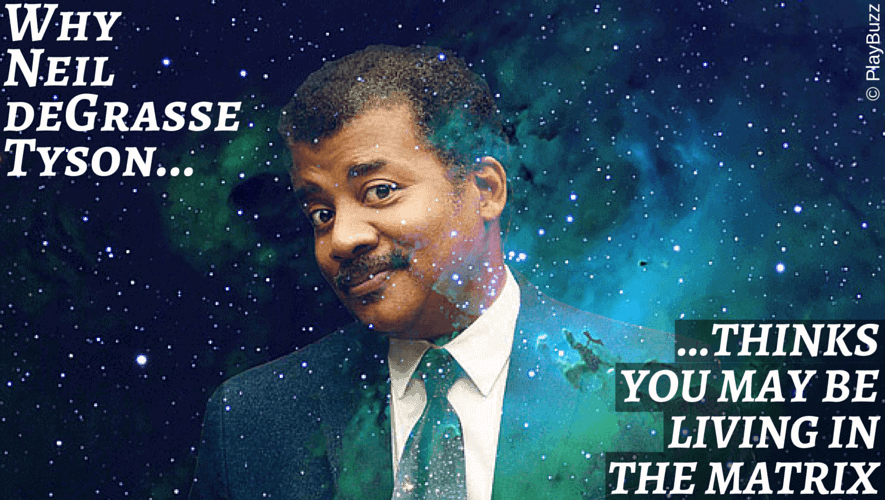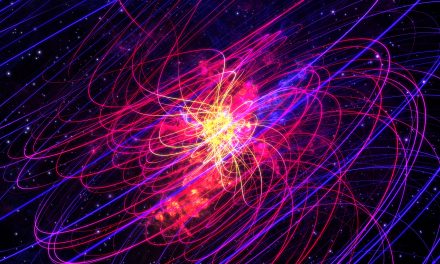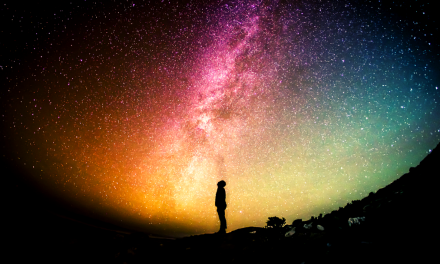I remember watching a documentary as a kid which freaked me out. It was narrated by Stephen Hawking I believe, and ended by saying that we may all simply be a simulation in a hologram universe. My mind went into overdrive. Was I real? Was I simply a virtual reality hologram played from a giant universe projector? And what is real anyway?
My mini-existential crisis persisted until I tremulously suggested this idea to my older brother, who laughed at it and essentially scorned me for believing everything I saw on television. Perhaps that was the first moment I realised I should place slightly more stock in my own experience of life, and more critically assess the thought experiments of bored scientists.
This month, that experience came in handy. In early April, Neil deGrasse Tyson, the science educator known best for that wonderful ‘watch out’ meme, chaired a meeting of physicists and philosophers discussing the question of whether the universe is a simulation—a Matrix-style apparition created by super-intellects who keep us fooled in our self-contained universe. Would we be able to tell if we lived in a giant invisible simulation, and if so, would it even matter?
The responses from the panellists ranged from ‘pretty plausible’ to effectively ‘lol that we’re discussing this.’ Tyson however, dropped what can only be termed a T-bomb at the end of the discussion, saying that he felt, “the likelihood may be very high.” His reasoning was elucidated in a thought experiment, which began with the premise that there is only a tiny amount (1-2%) of genetic difference between us and chimpanzees. As we perceive the animal kingdom to be completely unintelligent, Tyson said he could ‘imagine’ that there is another species out there with the same small disparity in genetic code causing a further giant leap in intelligence above us. What would we look like to this super-species? Says Tyson:
“We would be drooling, blithering idiots in their presence. That is not a stretch to think about. If so, it is easy for me to imagine that everything in our lives is just the creation of some other entity for their entertainment. It is easy for me to think that. So whatever the likelihood is… I’m saying that I will be the only one in the room saying I’m not surprised.”
These comments, in fact, this whole debate highlights some rather revealing trends in the scientific establishment at the moment.
Bad Science
Firstly, Tyson got his science wrong. We are not 1% of DNA away from primates. As Ann Gauger describes over on Evolution News, that apocryphal calculation includes only a fraction of the possible types of changes between primate and human genomes, with other changes accounting for far more than 1%. Not only might our coding DNA be significantly different from that of primates, but we may have other non-coding and epigenetic influences that produce vastly different phenotypes from similar genetic scripts, in the same way that the quality of music a fixed set of piano notes can produce varies according to the skill of pianist.
In reality, researchers as far back as 2007 were saying that it’s too early to precisely quantify how different our genomes are from those of primates. This is a cultural myth that has persisted simply because it’s funky to think we’re less ape-y apes.

Bad Logic
Tyson goes on to imply that the difference between us and animals is simply a difference in degree. His logic suggests that the reason why we can do trigonometry and apes can’t, is just because we’re a much better kind of ape. Similarly, if there was an equivalent disparity between us and a hypothetical alien, they would see us like we see apes- as animals. This assessment however doesn’t meet reality. Our difference to the animal kingdom is not one of degree, but one of kind.
Firstly, we’re able to regulate our natural moral impulses. As Mirza Ghulam Ahmad superbly elucidated over a hundred years ago, whilst an animal may show qualities like love, compassion, anger etc., unlike us it is unable to control those impulses for a higher moral purpose.
Secondly, animals have absolutely no spiritual bent. This can be attributed at its root to their missing language capabilities, a faculty entirely unique to humans. Ever wondered how a congenitally deaf child thinks? The answer is that unless they are taught sign language, they can’t think in the same way we can, leaving them severely mentally impaired. Our internal voice is a product of our language capabilities, the potential for which is hard-wired into our brains and subsequently utilised when we absorb vocabulary from our parents. Without the linguistic abilities that drive our higher reason, we are unable to engage in abstract thought, to deliberate over infinite regresses, and to ask questions of meaning and purpose. We alone are able to do this in the animal kingdom, giving us the potential to develop a relationship with the Creator through prayer and revelation.
Thus there exists a rather sharp line demarcating us and our furry friends. There may well be other extra-terrestrial life out there, (in fact the Qur’an positively affirms it), but we’ll only call them intelligent if they’re on our side of the line. The difference is in kind, not in degree.
Double Standards
Tyson says that if he could contemplate such life existing, then it may well exist, and it may well be powerful and smart enough to run computer simulations that to us seem real. Well, this isn’t an argument—it’s a series of speculations. (And how they managed to code for consciousness remains unexplained). What’s more surprising however is that Tyson says that this scenario may be highly likely. This for me was the kicker. Why is this un-evidenced, and highly speculative scenario deemed ‘highly likely’, whilst the far-more robust inference to Divine Design is boycotted and ridiculed in academic circles?
The parallels after all, are obvious. As the only philosopher in the debate quipped:
“Our creator isn’t especially spooky, it’s just some teenage hacker in the next universe up.”
Thus we can boil the two theories down to these abstracts:
Simulation hypothesis: Could there be unseen intelligent agents beyond our known universe that have produced what we experience as life through their vastly superior intellect and technology? Verdict: Highly likely.
God hypothesis: Could there be an unseen Intelligent Agent beyond our known universe that has produced what we experience as life through His vastly superior intelligence and power? Verdict: Get out of town!
Tomato, Tomahto; Potatoe, Potahto?
The parallels between the question of whether we’re in a simulation and whether we simply are manifestations of the Mind of God are therefore obvious. Both inferences are driven by an appreciation of how intelligent causation works—if we code things, are we also coded?—and both are driven by the lingering questions over our origins. The natural question that arises however is that if both ideas are similar, can the simulation hypothesis displace the God hypothesis?
It doesn’t seem so. For starters, nature doesn’t give any indication of being made by some kind of research group of competing minds, rather it seems to the product of one mind- operating flawlessly, repeating the same patterns throughout nature, with an entirely cohesive and rational structure to life, the universe, and everything.
Even more significantly, Tyson and co. contemplated a civilisation that is essentially a much better version of us, but still composed of beings that are spatial and temporal. However, the obvious question is: well, where did they come from? Were they simulations too? Is it simply simulations all the way down? In reality, such an infinite regress is impossible, and the path of logic takes you back not to another universe, or another group of beings, but to a single entity that is outside of time and space: eternal, immaterial, and indivisible.
The Mind of God
The theological and philosophical consequences of the simulation hypothesis are therefore fairly negligible. What’s more significant is that discussions such as these are seen as being fair-game scientifically, whilst the same scientific establishment generally dismisses out of hand the idea of a Creator God. And yet, which has more evidence? The simulation hypothesis has none aside from analogy, and is barely falsifiable. On the other hand, the God hypothesis has been testified to by well-nigh every civilisation in history. Not only that, but the witnesses themselves were no ordinary people—rather they were the architects of civilisations, universally renowned for their virtue and wisdom. If we seriously entertain ideas like the simulation hypothesis, why don’t we seriously entertain the God hypothesis? Why don’t more of us seek to pursue it, to test it and determine whether its claims are true?
Perhaps there is a greater reality out there. The only question is: will you take the red pill, or the blue pill?
The choice is yours.
Read more:









This article is excellent! the beautiful video of nature by numbers is breathtaking. The only question I have is the idea that animals do not have languages. Can you elaborate?
Hi Tammara! Yes- what linguists have noticed is that animals have nothing even approaching human verbal or sign language. The most they seem to do is primitive gesturing, but that’s it. This creates a huge gulf between us and animals. Without language, we can’t think with that ever-comforting internal voice, which hugely impairs our reasoning ability.
What’s a mystery is that grammatical rules seem to be pre-programmed into our brains, and they’re not pre-programmed into the brains of animals. That’s why we have the potential to learn language, and they don’t. This highlights the design of humans by God Almighty: he both pre-programmed grammatical rules into our brain, and then must have revealed vocabulary and language to early man.
“The Gracious God, He revealed the Qur’an, He created man, He taught man the skill of expression.” (55:3)
It is telling that Allah prefaced this verse with the attribute Ar-Rahman- the one who grants Grace without any work done by the recipient of that grace. That’s how linguists and biologists are calling the pro-programmed language of capacity of man- like a ‘gift’ which was not earned: http://www.evolutionnews.org/2016/02/language_as_an_102645.html
They’re all scratching their heads over it lol.
PS: If you make a profile, you can comment without the approval system slowing you down!
I have 2 questions:
1. In the discussion of the simulation, it seems that everyone assumed that if we are in a simulation, we are puppets on strings. But couldn’t a technology capable of constructing the simulation, incorporate an unpredictable element of uncertainty, hereby preserving free will?
2. A question for Dr Tyson. If an observer(A) leaves behind an observer(B) . And observer(A) accelerates to within fractions of the speed of light with respect to observer(B), observer(A) will experience relativistic effects, but since observer(B) is moving near light speed with respect to observer(A), shouldn’t observer(B) also experience relativistic effects?
Hey Jack! Thanks for the questions. I’ll leave Q2 to the physicists but as for Q1…
I guess that’s playing on the idea that quantum uncertainty produces free will. I don’t think that’s quite right though. Free will is a conscious decision making process- it is *choice*. Quantum uncertainty on the other hand is *chance*. Those two are very different. Therefore by including quantum uncertainty you do not automatically produce free will- you just introduce multiple possible outcomes which must still be chosen by a consciousness.
This hits at the deeper problem hinted at in the article: how do you code for consciousness? If the seat of consciousness is some ‘other’ quality we have which is non-material then it ain’t going to happen. And if we are simply a rerun of our alien super-designers, then how did they hack their own ‘souls’ to encode them?
Lots of problems haha.
More importantly what is the dimensional size of the matrix? THIS is the important part!
Is it NxM, is it a vector space. is it in hilbert space? What transformations is it subject to?
HOW DO THE LAWS OF LINEAR ALGEBRA apply?!?!
Does an operator need to be hermitian? unitary? Does it even need to span the space???
WHAT BASIS DOES IT OPERATE UNDER?!?!?